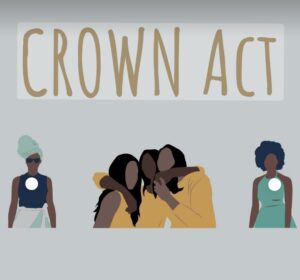
The House of Representatives passed legislation on March 18 that would prohibit discrimination against people with hair styles associated with a particular race or national origin. Lawmakers in Washington passed the bill, titled Creating a Respectful and Open World for Natural Hair, or Crown Act. In the 235-189 vote, only 14 Republicans joined Democrats in support of the measure.
Supporters argued that properly banning hair discrimination is necessary because African Americans are often penalized under workplace and school dress code policies that dislike hairstyles such as afros, braids and cornrows.
More than a dozen states have passed laws to formally ban hair discrimination. The Massachusetts State House became the latest on Thursday after it passed a version of the Crown Act unanimously, following a push by two Black teenage girls who were suspended from school events over their braid extensions.
“For too long, Black girls have been discriminated against and criminalized for the hair that grows on our heads and the way we move through and show up in this world,” said Rep. Ayanna Pressley (D-Mass.).
Black women are more likely to report feeling discriminated against because of their hairstyles. A 2019 study conducted by the JOY Collective found that Black women were 80 percent more likely to feel that they had to change their hair from its natural state to fit in at the office.
In 2013, the Equal Employment Opportunity Commission filed a racial discrimination lawsuit against an Alabama insurance company arguing that it wrongfully denied a job to Chastity Jones, a Black woman with dreadlocks. The company allegedly told Jones it did not permit dreadlocks under its grooming policies and said she would need to cut them as a condition of her employment.
A federal district court in Alabama dismissed the claim, stating that the hiring decision didn’t meet the claim of racial discrimination because hairstyles aren’t immutable traits like skin color.
The NAACP Legal Defense and Educational funds petitioned the Supreme Court to review the case in 2018, but the court declined.
House Republicans questioned the need for the legislation in March because they believe existing laws that ban race-based discrimination are already pertinent.
“It’s covered. It’s wrong if it happens,” said Rep. Jim Jordan (R-Ohio), the top Republican on the House Judiciary Committee.
Rep. Bonnie Watson Coleman (D-N.J.), the bill’s sponsor and a member of the Congressional Black Caucus, accused Republicans of failing to understand the discrimination that Black people face. “I understand that my colleagues on the Republican side don’t get the vast array of discriminatory practices because they spend so much time trying to perpetuate an all-white society here in the most diverse country in the world,” Watson Coleman said.
“But nonetheless, this bill is vitally important. It is important to the young girls and the young boys who must cut their hair in the middle of a wrestling match in front of everyone because some white referee says that your hair is inappropriate to engage in your match,” she said, appearing to refer to the case of a Black high school wrestler, Andrew Johnson, in her state in 2018.
The bill faces an uncertain future in the United States Senate, given the widespread GOP resistance to almost every measure proposed by Democrats. At least 10 Senate Republicans would have to support the bill for it to overcome any hindrance.
According to a release from the White House, President Biden has expressed support for the legislation and indicated he would sign it into law if it reaches his desk.
For Black people, hair isn’t “just hair.” Our hair is our crown, and the celebration of it as such is deeply woven into our ancestral history. But, often, the coils, locs and braids we proudly wear are deemed “unkempt” and “unprofessional” for public spaces.